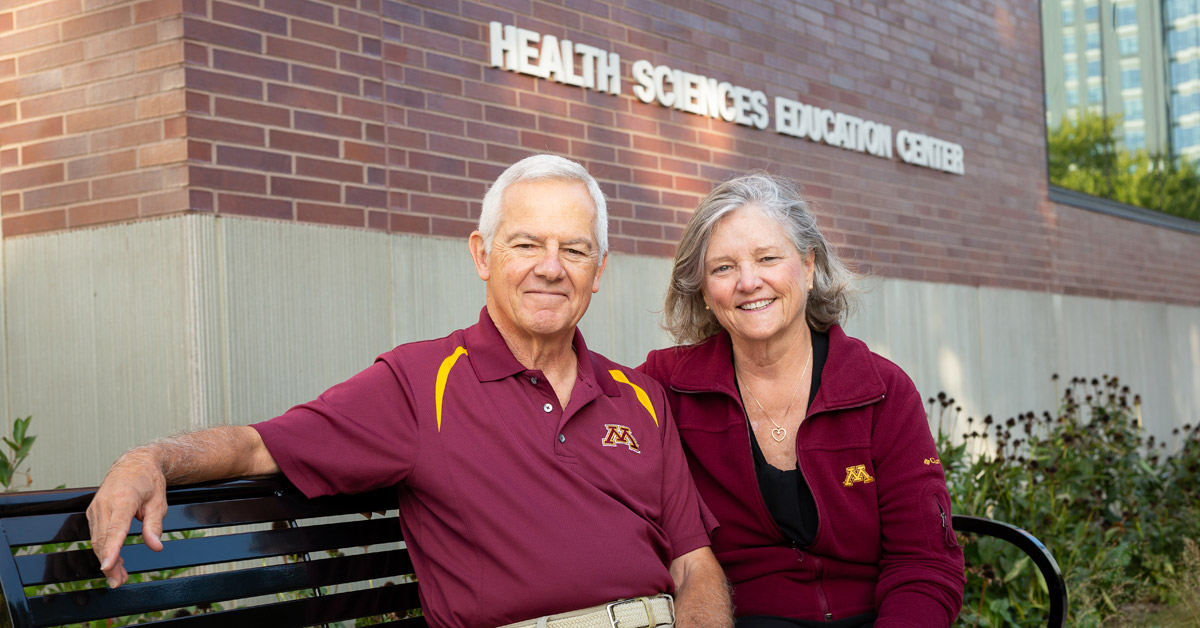Mary Ellen Wells and Bill Arendt Ensure the Sustainability of Public Health Education
By Mo Perry
“I’m in awe of nurses and doctors and other providers who can lay hands on others and help them heal. If I can be in the background helping them, that’s what brings me joy.” — Mary Ellen Wells
Both Mary Ellen Wells (MHA ‘84) and her husband Bill Arendt grew up with strong role models who instilled in them the value of giving back. It’s a value that’s readily apparent in many aspects of their lives and careers, not least of all their generous giving to the University of Minnesota School of Public Health (SPH).
Before embarking on a multi-faceted career spanning education, healthcare administration, academia, and consulting, Wells grew up one of four children in an eclectic neighborhood on the northwest side of Detroit. “My mom used to put out a bowl of fruit on a card table in the alley behind our house,” Wells recalls. “Homeless people could come by and take an apple. She did that without any fanfare. She was active in school, church, and community events, and she instilled those values in me.”
Her father, a refrigeration contractor who serviced the many warehouses in the Eastern Market of Detroit, often went to a corner where unemployed men would gather in the morning, hoping for work. “My dad would go pick up a guy or two to help him for the day. We were far from wealthy, but it was a subtle way of helping.”
Arendt grew up one of nine children in Chicago, and found similar philanthropic inspiration in his father, who worked for the Metropolitan YMCA. He studied for an MBA at the U before pursuing a career in accounting and finance. Arendt and Wells met at the University of Minnesota in the late 1980s. Wells had received her master of hospital and healthcare administration (MHA) degree from the School of Public Health and was working at the University Hospital with Dr. Elizabeth Arendt to enhance the U’s sports medicine program for intercollegiate athletic programs. Dr. Arendt introduced Wells to her brother Bill, who was a divorced father of four children.
The rest, as they say, is history. Arendt and Wells now live in Annandale, Minnesota, and are proud grandparents to eight grandchildren, all of whom live in the Twin Cities. They’re actively involved with a range of nonprofit organizations, including the Annandale Food Shelf, Serve Minnesota, Minnesota Community Measurement, True Friends, and Light the Legacy.
After having served at the highest administrative level at both urban and rural hospital systems, Wells says she still gravitates most to the mission of smaller community hospitals, as well as the areas of long-term care and aging services. One of the highlights of her career was mentoring a group of MHA students who studied and recommended establishing a geriaritic behavioral health center at the CentraCare hospital in Monticello, MN; another recent MHA graduate provided project management support for the center’s development, and Wells saw it operate at full capacity soon after opening.
Athletics have been important in Wells’ and Arendt’s family life as well, and that’s reflected in their giving. “All of our kids are very active in sports, and we saw the difference it made for them, being able to be on teams and be active — it helped shape their lives,” says Wells. Avid Gopher fans, Wells and Arendt have established a fund at the university that will support student athletes in the women’s athletic program who want to focus on health.
In addition, they give generously to the Leadership for Aging Well Scholarship, Rural Health Research Center Fund, and the MHA Program. Wells is also very involved as an adjunct faculty member, and is past chair of the MHA alumni board.
“Now especially, given what we’re seeing about the importance of public health, it’s good to see SPH finally getting its due,” says Wells. “Everyone has been touched by public health, from clean water systems to the recognition of social determinants of health.” And supporting public health initiatives will take more than just revenue-generating programs, she notes. “Philanthropy is a huge part of sustainability for public health.”

